
Pablo Neurda

Pablo Neruda is arguably Chile’s most well-known literary figure. A Nobel Prize in Literature recipient, Neruda is renowned for his moving poetry about his home country and South America. In addition to his poetry, Neruda spent much of his life working as a diplomat and politician, becoming a target of the Pinochet dictatorship due to his involvement with the Chilean Communist Party, and close professional relationship with Socialist president Salvador Allende. It is widely suspected that his speedy death at the age of 69 from prostate cancer was hurried along by foul play from Pinochet’s secret police. Some of central Chile’s most popular tourist destinations are his three whimsical houses: La Chascona in Santiago, Isla Negra in the small coastal village of Isla Negra, and La Sebastiana in Valparaiso.
Featured book: “Twenty Love Poems”
First published in 1924, “Viente Poemas de Amor y una Cancion Desperada remains among Neruda’s most popular work. Daringly metaphorical, these poems are based upon his own private associations. Their sensuous use of nature symbolism to celebrate love and to express grief has not been surpassed in the literature of our century. This edition offers the original Spanish text, with masterly translations by W.S. Merwin on facing pages.
Gabriela Mistral

Before there was Pablo Neruda, there was Gabriela Mistral. Born in 1889, her emotionally powerful verses, evoking themes like nature, love, grief, travel, betrayal, and multicultural identity, earned her a Nobel Prize in Literature, making her the first Latin American author to receive the honor. She also worked as an educator and diplomat, living and working all over the world before her death in 1957. She currently appears on the Chilean 5,000 peso note.
Famous and beloved during her lifetime all over Latin America and in Europe, Mistral has never been known in North America as she deserves to be. The reputation of her more flamboyant and accessible friend and countryman Pablo Neruda has overshadowed hers, and she has been officially sentimentalized into a “poetess” of children and motherhood. Translations, and even selections of her work in Spanish, have tended to underplay the darkness, the strangeness, and the raging intensity of her poems of grief and pain, the yearning power of her evocations of the Chilean landscape, the stark music of her Round Dances, the visionary splendor of her Hymns of America.
Featured book: “Motivos: The Life of St. Francis”
“In this superb critical edition, Horan has collected, edited, and translated the various prose texts that Gabriela Mistral devoted to St. Francis, a figure of utmost importance to the deeply religious poet and to the spirituality of Latin American literature and art. The inspired translation of Mistral s idiosyncratic Spanish prose into English captures the rhythm and the delicate, lyrical quality of the original, a feat made even more admirable by the addition of an elucidating and comprehensive critical afterword. This is the definitive edition of a work that had yet to be presented in its entirety in such an organized and illuminating way.” Santiago Dayd -Tolson, The University of Texas at San Antonio.
Nicanor Parra

Considered one of the most important and influential poets in Chile and throughout South America, Nicanor Parra deemed himself an “anti-poet” due to his style, which strayed from traditional Latin American literary styles by using more colloquial language and bold themes. His collection “Poemas y Antipoemas” is widely considered to be one of the best Spanish language poetry collections of the twentieth century. He has also worked as a mathematician and physicist. Born in 1914, he turned 100 in 2014, and as of 2016, is still living.
Isabel Allende

Isabel Allende is a Chilean-American author, who is internationally lauded for her novels and memoirs, such as “The House of the Spirits,” “The City of Beasts,” and “Zorro.” Her fictional work generally falls into the realm of “magical realism,” a popular motif in South American literature. A relative of President Salvador Allende and a journalist, she left Chile during the dictatorship for the safety of herself and her family, and although she frequently returns to visit, she now lives permanently in the United States.
Featured book: “My invented country”
Written by one of Chile’s modern literary stars, novelist Isabel Allende, “My Invented Country” is a loving but objective look at life in Chile before, during, and after the Pinochet dictatorship through the eyes of a young journalist who grapples with her decision to leave the country. Author of such beloved novels as “Zorro” and “The House of the Spirits,” Allende draws readers into her childhood with her distinct writing style, balancing humor and wit with somber reflections about the life of a expat. Go behind the scenes of the ancient house and family that inspired “The House of the Spirits,” explore the streets of Santiago and the Chilean countryside, sit at the table with a Chilean family, and follow Allende as she struggles to come to terms with the triumphs and tragedies of her life as she leaves Chile and permanently settles in the USA, connected by the events of 9/11, a date of loss and tragedy in both Chile and the US. For travelers hoping to know more about Chilean culture and home life from an insider’s perspective, “My Invented Country” is a must-read.

